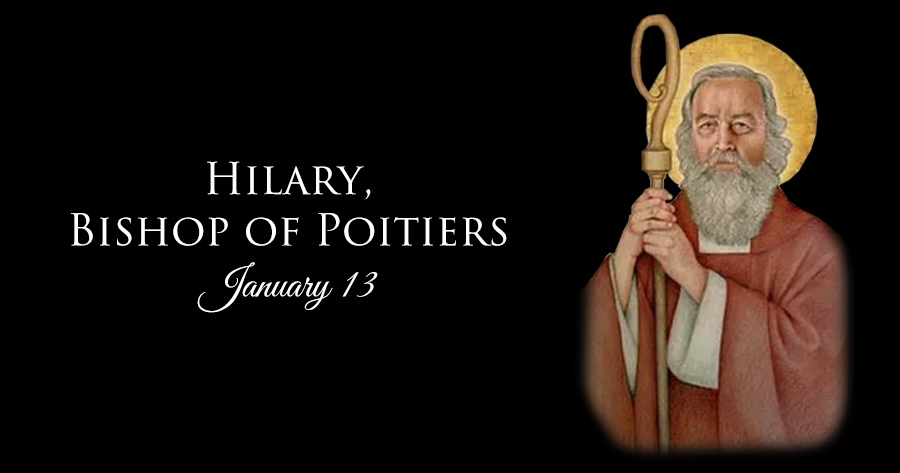
About the Commemoration
Hilary (his name derives from hilaris, “cheerful”), praised by Augustine as “the illustrious doctor [that is, teacher] of all the churches,” was born in Poitiers, Gaul, about 315 to a wealthy and powerful pagan family. He was baptized when he was about thirty years of age, and in 350, although he was married and a layman, he was made bishop of Poitiers by popular acclamation and insistence. His tenure was troubled by controversy with the Arians, who denied the divinity of Christ. In 356 the Emperor Constantinus, because Hilary did not accede to his demand that all Western bishops adhere to a compromised Nicene faith, banished him to Phrygia in Asia Minor. He remained there for three years, writing scriptural commentaries and his great work On the Trinity. He was allowed to return to Poitiers in 360, to the great joy of his people, and from that time on his teaching gained general acceptance in Gaul. He became the most respected Latin theologian of his age, and because of his time in Asia Minor he was able to introduce some of the insights of the Eastern theologians into the Western Church.
St. Jerome says that Hilary wrote the first Latin hymns. During his exile Hilary was profoundly impressed with the singing of Greek hymns, and he says that when he returned to the West he brought some of these hymns with him. Most of Hilary’s hymns have perished, but a few, notably Lucis largitor splendide, are with some reliability attributed to him. These hymns, in the judgment of John Julian’s Dictionary of Hymnology, “are not without a certain rugged grandeur, well befitting the liturgical purposes they were intended to serve.” These hymns introduced “the first germs of Latin rhythms” which were to flourish in later Latin hymnody. But Hilary’s efforts at introducing hymns into the Church in Gaul were unsuccessful, and he complained that the Gauls were unteachable in sacred song. Success in introducing hymn singing in the West came with Ambrose.
An inveterate and vigorous controversialist and a tireless defender and teacher of Orthodoxy, Hilary was nonetheless a compassionate and loving pastor. Among his disciples was Martin, later Bishop of Tours (see November 11). Hilary died in Poitiers on this date in 367.
Excerpts from New Book of Festivals & Commemorations: A Proposed Common Calendar of Saints by Philip H. Pfatteicher, copyright, 2008 by Fortress Press, an imprint of Augsburg Fortress.
See also: Hilary of Poitiers
Reading
From Book 1 of On the Trinity by Hilary
Almighty God and Father, I regard it as the chief duty of my life to make my every thought and word speak of you. The gift of speech which you gave me cannot have a more noble use than to serve you by making you known as the Father of the only-begotten Son of God, and preaching this to the world that does not know you and to the heretics who refuse to believe in you.
That is what I desire to do. But I need to pray for your help and mercy, so that, when I spread the sails of our faith you will fill them with the breath of your Spirit to drive us onward. I need not be afraid. We have the promise, and he who made the promise is trustworthy, “Ask and it will be given you; search, and you will find; knock, and the door will be opened for you” [Matt. 7:7].
In our need we will ask for what we lack. We will study the writings of your prophets and apostles with unflagging attention and knock on the doors where meaning is kept. But it is for you, Lord, to give when asked, to be present when we seek you, and to open when we knock.
Our nature is sluggish, and in our attempt to penetrate your truth the weakness of our minds holds us in the prison of ignorance. Nonetheless, we are able to comprehend divine ideas by earnest attention to your teaching and by obedience to the faith which carries us beyond the natural range of our minds.
Help us therefore as we begin this ambitious venture, and bless it with good results. Give us a share in the spirit of your prophets and apostles so that we may understand precisely what they meant to say and express their meaning in appropriate terms. Our subject will be the mystery of which they spoke: you, the eternal God, the Father of the eternal, only-begotten God; you, the unbegotten God and the one Lord Jesus Christ, born of you from all eternity. He is not another god, as though different from you in nature, but he is himself true God, born of you who are the true God and Father.
Impart to us, then, the meaning of the words of Scripture and the light to understand it, honoring the doctrine and confident of its truth.
Trans. PHP, based on that of A Short Breviary by St. John’s Abbey and the International Committee on English in the Liturgy
Propers
Almighty God, your servant Hilary defended the divinity of Jesus Christ your Son: Give us, we pray, a deeper understanding of this mystery and help us profess it in all truth, that we may rejoice in having you for our Father, and may abide in your Son, in the fellowship of the Holy Spirit; who live and reign, one God, now and forever.
PHP, Proper of Poitiers, RS, + LFF
Readings: Psalm 37:3-6, 32-33 or 119:97-104; 1 John 2:18-25; Luke 12:8-12 or John 15:9-17
Hymn of the Day: “Father, most holy” (LBW 169, LSB 504, ELW 415); see “Hail this joyful day’s return” (H82 223, 224), a hymn for Pentecost attributed to Hilary
Prayers: For teachers of theology facing opposition because of the adherence to the apostolic faith; For bishops that they defend and maintain the catholic faith; For closer relations between the Eastern and the Western Churches.
Preface: Trinity Sunday
Color: White
